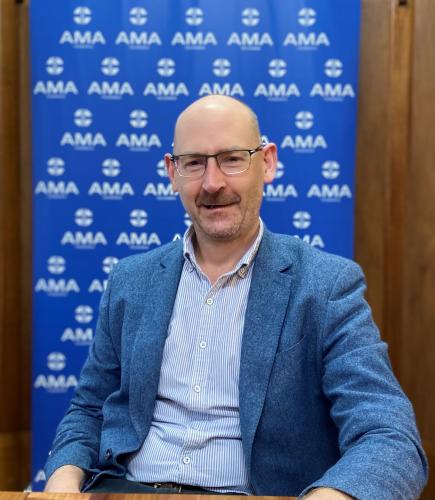Changing of the guard - Dr Michael Lumsden Steel assumes the presidency of AMA Tasmania
The Australian Medical Association Tasmania proudly announces the election of Dr Michael Lumsden Steel as its new President and Dr Helen McArdle as its vice president as the Tasmanian association moves into a new era, merging with the Federal body of the AMA.

Dr Lumsden Steel, a well-known and respected anaesthetist with a robust background in medicine and military service, brings his expertise, unwavering commitment, and compassion to his new role.
“I am honoured to be following in the footsteps of those who have put their hands up to be the voice of our profession before me. In doing so, they have worked with the Tasmanian government and healthcare leaders to improve healthcare delivery to Tasmanians.
“I accept the challenges of this substantial responsibility, knowing I will be ably supported by Dr Helen McArdle, a former President, now Vice-President of AMA Tasmania.
“We take on these roles at an exciting time of reform, whereby AMA Tasmania will be moving forward as a branch of AMA Federal. I look forward to the benefits this will bring to our small office and representation in Tasmania.
“I’d like also to commend the service to medicine and the community that Dr John Saul and Dr Annette Barratt have made in these important representative roles for AMA over the past two years.
“Medical leadership is a significant and essential role requiring a tremendous amount of work and dedication, which both John and Annette have delivered tirelessly.”
Dr Lumsden Steel went from St Virgil’s College into the defence forces studying medicine. Career highlights included serving in the Royal Australian Air Force as a full-time RAAF medical officer from 1994 through to 2017, with periods of full-time and reserve service, including operational deployments to East Timor and the Middle East. He became a specialist anaesthetist in 2014 and now works across his public and private anaesthesia practice in Hobart.
As a local Tasmanian-trained doctor, he has been a strong advocate for trainees as part of the AMA Council for Doctors in Training and the ANZCA Trainee Committee, as well as for anaesthetists with the Australian Society of Anaesthetists, public sector doctors as Secretary of the Tasmanian Salaried Medical Practitioners Society and the medical profession and patients through AMA Tasmania.
He also led the recent Enterprise Bargain Agreement (EBA) negotiations for public sector doctors, securing competitive wages for doctors that will help to ensure Tasmanian patients have the medical services they need.
Dr Lumsden Steel’s relentless advocacy for improved working conditions for medical professionals in Tasmania underscores his commitment to ensuring a supportive environment. His firsthand experiences navigating the challenges of training, career transitions, and economic pressures provide valuable insights into the reality medical trainees and professionals face.
“As President of AMA Tasmania, my focus will be on working with the state and federal governments and other key stakeholders to ensure that there is a comprehensive understanding of the medical workforce requirements now as well as a plan for the future.
“It is essential that the medical workforce, including general practitioners, community specialists, private practice specialists and public hospital doctors, are integrated and not working in silos.
“The Tasmanian Health Service must rebuild its reputation as a leader and preferred employer by supporting, training, and retaining medical students, junior doctors, and specialists.
“There needs to be an open, honest discussion and frank disclosures on the state of health funding to identify the extent of the funding shortfall and address it locally and nationally.
“Cost shifting of services, siloed inquiries and short-term funding solutions are not going to fix the system. The Tasmanian Health Senate is a key independent body that needs to be funded, energised, and supported to be able to speak freely.”
Dr Lumsden Steel believes that Tasmania is uniquely positioned for the federal and state governments to work collaboratively to address public hospital underfunding.
“Government and private investment are required to deliver the necessary health infrastructure needed in Tasmania to open new subacute beds, to build the necessary mental health inpatient facilities, to open low acuity facilities and deliver more aged care beds, with the workforce and technology to do so.
“The private system also has an important role to play in patient care. The recent withdrawal of services provided in private facilities (such as the closure of the mother-baby unit and mental health ward at St Helen’s Hospital) and the cancellation of major private hospital redevelopments around the state are red flags.
“The AMA has called for the private health insurers to be accountable for their underfunding for services delivered in private hospitals. Public and private hospitals must be able to complement each other, and the private health insurers need to step up.
“Years of record profits are at the expense of private hospitals’ sustainability, and their ability to invest in new facilities, offer competitive wages to attract and retain staff, and invest in medical innovations for the future.” >>>ENDS



